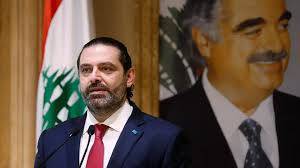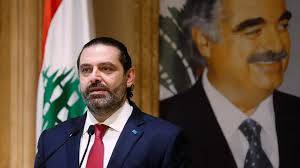In memory of his father's assassination, President Saad Hariri reaffirmed what he stated at Baabda Palace. After his phrase about the "golden opportunity" to exit the impasse, he used the phrase "push of a button" yesterday, carrying the same significance. Both phrases seem enticing for the President of the Republic to accept what is unlikely for him to agree to.
When he insisted at Baabda Palace, following his meeting with President Michel Aoun, on his conditions for forming the government, and his insistence on a government of specialists with 18 ministers, refusing the one-third +1 to any of the parties, including the President himself, the designated Prime Minister Saad Hariri did not seem like himself. This insistence - which some considered stubbornness - is unusual in his behavior, as he is accustomed to keeping doors open, accepting realities, and even bending in the face of the storm. Hariri: The Blocking Third is Impossible.
Since his remarks last Friday, suggesting he would only accept his proposed terms this time, effectively shutting the door on any dialogue outside of what he wants and what he rejects. This is not how he has historically operated since his first governments in 2009, when he granted the opposition the one-third +1, and in the 2016 and 2019 governments when he acquiesced to what the President and the Free Patriotic Movement insisted upon. Currently, without a confrontational tone and addressing the President as a partner rather than an adversary - a tone that characterized his words at Beit al-Wasat yesterday - Hariri displayed patience and a lack of urgency, asserting that he would not relinquish his mandate regardless of the pressures and the passage of time. Thus, the comments from Beit al-Wasat did not significantly enhance his statements from Baabda Palace, other than elaborating on the details of his negotiations with Aoun under the ceiling he set, which is that he is the one who forms the government. This is the essence of his use of the terms "golden opportunity" at Baabda Palace and "push of a button" at Beit al-Wasat, as if the President must not miss them and must accept them. The designated Prime Minister is now engaged in the usual game, reversed from his past habits: instead of bending, he expects the President to bend during the third part of his term.
When he said on Friday at Baabda that there is a "golden opportunity" that must not be wasted, holding the parties - explicitly the head of state - responsible, there was a murmur about what he aimed for with that phrase following his return from Paris after a meeting with French President Emmanuel Macron, surrounded by ambiguity and confusion from every angle, protocol-wise, media-wise, and politically, in addition to sentimentally, particularly considering the long-standing warm relationship between the Elysee and the Hariri family, well-regarded in its corridors and with its owner.
The phrase "golden opportunity" is not merely a spontaneous remark from the designated Prime Minister after meeting Aoun; it represents - according to what circulates inside the walls of Beit al-Wasat - a culmination of his latest movements, starting from the United Arab Emirates and ending in Paris. Certainly, excluding a trip to Turkey limited to a personal matter for him.
According to what is narrated from behind those walls, when he began this round - which also had personal concerns - he sought Arab and international positions that would support his efforts to form a new government, initially aiming to secure backing from the UAE and Egypt to break the severed relations with Saudi Arabia, and then France and its parallel role with Washington.
From the outcome of this round, he concluded the following findings:
1. He received a promise from the UAE and Egypt to support him as Prime Minister of Lebanon, and to provide assistance to Lebanon in the upcoming phase, on the condition that he forms a government according to the specifications he set: a small cabinet of 18 specialist ministers, without party-affiliated individuals, particularly those linked in one way or another to "Hezbollah" and the Free Patriotic Movement, and that the President, considered a strong ally of "Hezbollah," should not have the quorum needed to paralyze the government or impose its resignation. The Emiratis and Egyptians did not oppose a government of specialists that would not antagonize the major parties and blocs, but whose ministers do not emerge from them. He also requested from them to restore normal relations with Saudi Arabia. Hariri cannot enter the Grand Serail without Riyadh's approval, even amid the severance in recent years. What has become clear is that any new Saudi shift regarding him will follow the formation of this government and will not precede it. This is the clear signal sent to the Emiratis and Egyptians that they await to see how the designated Prime Minister addresses his relationship with the President and "Hezbollah" in the upcoming phase.
Hariri visited Baabda following the advice of the French President.
2. The designated Prime Minister carried this promise to the French President at a dinner on February 10, informing him of his reliance on it and on the support of the Emiratis and Egyptians for his plan. Macron's response was to advise his guest to return to Beirut and meet with the President, reiterating the specifications for the new government that reflect what the French initiative calls for, particularly the appointment of specialists with no ties to parties and blocs. He left him a reasonable margin to articulate to the President what he can and cannot do. The visitor accepted the advice and met with Aoun in the hours following his return from Paris, insisting on the draft he had previously presented on December 23, which the President rejected. He reaffirmed that the President's share includes six ministers, including an Armenian, which prevents him from obtaining the one-third +1, in addition to limiting the number of ministers to 18. In what Hariri told the President, he carries the approval of the architect of the initiative, the French President, for the specifications he proposed and nothing else. It was natural that Aoun's response would be to reject the draft, which had already been outright rejected since December 23.
3. In the content of the promise that now intersects between the UAE, Egypt, and France, is securing American support for Hariri's task under those conditions: a government that has no presence of "Hezbollah" and no actual quorum for Aoun, coupled with an insistence from the Americans that the formation of such a government, if it occurs, should not affect the American-Iranian negotiations, nor should any of its elements be involved. What the Americans aimed for was that forming such a government did not constitute an Iranian concession falling among the negotiation papers between Washington and Tehran. The Americans stated that their negotiations with the Iranians have a timeline that does not involve Lebanon in its early stages, nor does it require it to be an advanced item or imposed at this present time.
The "golden opportunity," in the view of the designated Prime Minister, is not perceived the same way by the President, who approaches the formation of the government in a completely different manner. Therefore, it was natural for the fifteenth meeting between them to fail again unless something occurs to overturn their wills, leading to a further rupture akin to what existed between December 23 and February 12.




